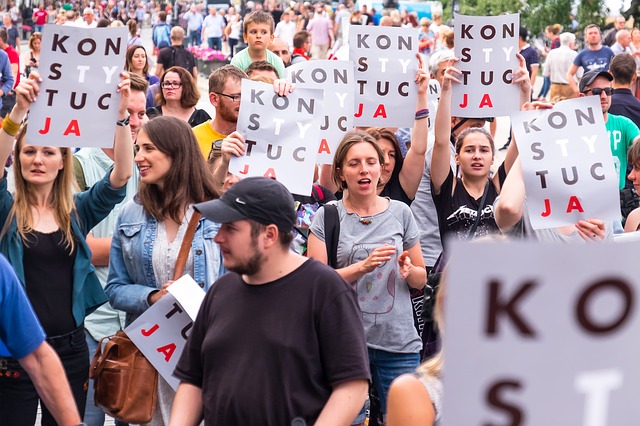
‘Poland has not yet perished … we shall prevail’—the most prominent lines of Poland’s national anthem—roared from thousands of throats during protests in the central European country in July. They capture well the motivation behind Poles taking to the streets to voice their disagreement with the current government. The Polish experience can teach valuable lessons to a world facing rising populism and nationalism, where ‘strong’ leaders exploit traditional views and create authoritarian-like governments once in power.
Mirroring a global trend, Poland elected the national-conservative party Prawo i Sprawiedliwość (Law and Justice; PiS) to government in 2015, after a campaign focusing mainly on social issues. PiS promised, among other things, that it would introduce child benefits, reverse a prior increase to the retirement age, and reduce taxes for the poor. Beata Szydło, now prime minister, focused on the rural, mostly working-class population (which hasn’t benefited much from Poland’s economic boom) and avoided polarising statements. Meanwhile, the chairman of PiS, Jarosław Kaczyński, stoked fears with populist statements targeting refugees—especially Muslims—claiming they would bring in diseases and parasites. Kaczyński was prime minister from 2006 to 2007, but he doesn’t currently hold any government position. However, he’s seen as the puppet-master behind PiS, and foreign leaders such as Chancellor Angela Merkel know enough about his influence to meet with him.
As it has with populist movements elsewhere in Europe and across the globe, fatigue and disappointment with other established political representatives played into PiS’s hand. The main opposition party, Platforma Obywatelska (Civic Platform; PO) ruled for eight years before losing to PiS in the presidential election in early 2015, and then in the parliamentary elections in the fall. PO is seen as a party of the political establishment. It had forfeited a lot of trust during a wiretapping scandal that revealed sensitive political conversations on private deals and eventually led to the resignations of three ministers and the Speaker. The scandal broke four months before the parliamentary elections and turned voters away from PO. Another factor in favour of PiS was the lack of a viable left-leaning alternative to centre-right and right-wing parties. Electoral participation was, as usual in Poland, low at 51% (the average is 48%). PiS won with fewer than 6 million votes out of the 15.2 million valid ballots cast, allowing it to rule with an absolute majority.
Shocked by the results, many Poles began regularly taking to the streets to express their support for progressive thinking, liberal values and the EU, and their opposition to the government. The two most widely covered protests were last year’s ‘Black Monday’ rallies, in which millions of people protested against the proposed complete ban on abortions, and demonstrations and sit-ins around the parliament blockade in December 2016, opposing plans to restrict press access to parliament and its members and attempts to restrict the freedom of assembly. Following public pressure, PiS abandoned the proposed laws.
July 2017 was even more significant: the PiS government had announced a plan to ‘reform the judiciary’, claiming the judicial system still operated under the same procedures as under communism, institutionalising corruption and protecting elites. Bills were drafted that proposed making the appointment of common court judges through the minister of justice; replacing most Supreme Court judges, only sparing those appointed by PiS; and handing to parliament the authority to appoint the members of the National Council of the Judiciary (which safeguards the independence of judges and courts). All of those propositions blur the lines of separation of powers. If they were to become law, the judiciary would end up under the control of the executive and legislative branches. Hundreds of thousands of people across the country protested following the adoption of the three bills by the Polish parliament. Protestors claimed the bills were in breach of the Polish constitution, and urged President Andrzej Duda to veto all three.
Duda, a former member of PiS himself, had supported all previous PiS endeavours. Much to PiS’s surprise, the Polish president vetoed the bills on the Supreme Court and the National Council of the Judiciary. Whether that was due to public pressure or to impending threats by the European Commission remains open to speculation. However, he did sign the bill addressing the common courts’ structure, and political protests recommenced shortly afterwards.
The government wasn’t pleased with the protests and began denying their existence—Interior Minister Blaszczak claimed that people simply went for a walk. PiS also accused protestors of being financed by foreign actors, a tactic commonly used in Russia or China. The pro-government media supported the allegation of ‘astroturfing’ (that claim was also soon spread via Twitter-bots), or German ministers financing the alleged ‘putsch’.
Poles have a long tradition of publicly voicing discontent (most prominently, the Solidarność (Solidarity) movement, which helped to overthrow communist rule). In the most recent protests, many young Poles have taken to the streets alongside their parents and grandparents for the first time. Often accused of being largely apolitical, Poland’s Generation Y and Millennials joined the demonstrations, voicing their concern that the ‘system’ most of them grew up with is now at stake. Even some who had voted for PiS joined the demonstrations. The protesters sent a clear message: the Polish people will prevail. With local elections coming up next year, we’ll see whether that is the case.

